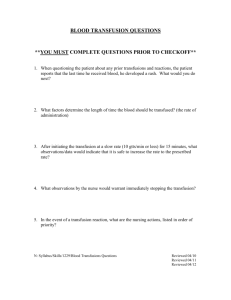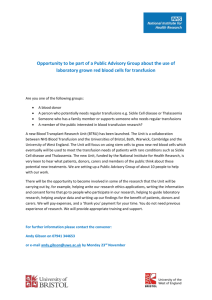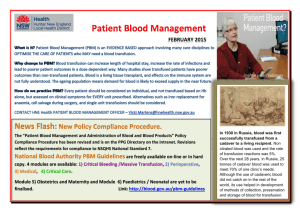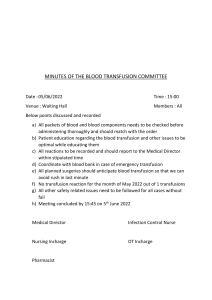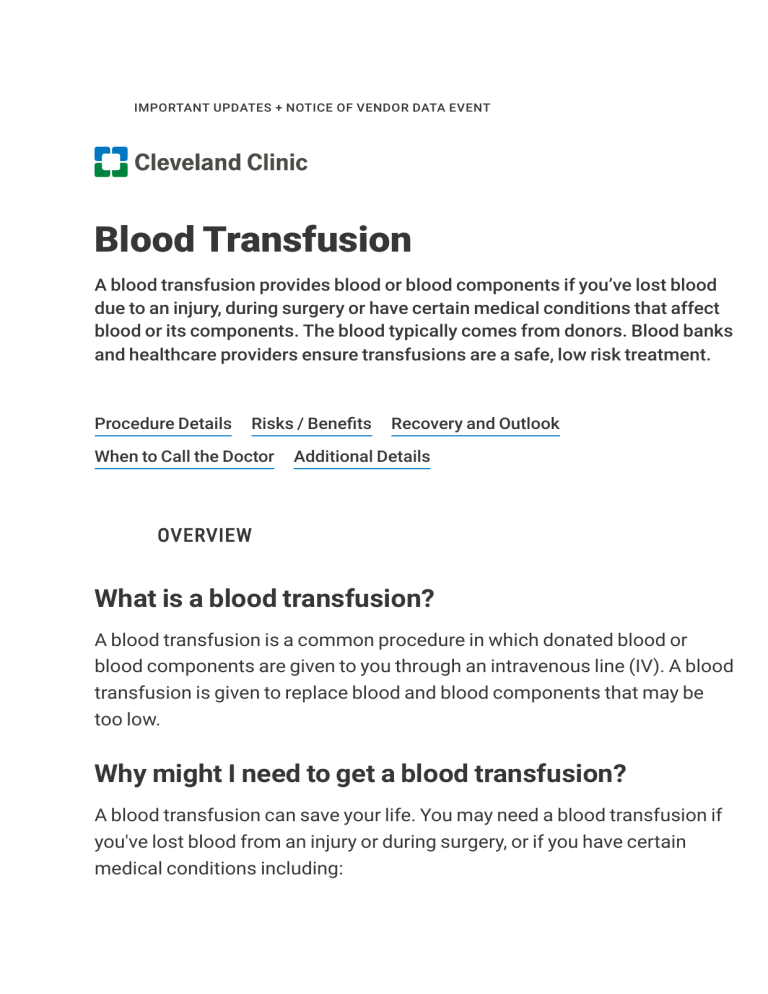
IMPORTANT UPDATES + NOTICE OF VENDOR DATA EVENT Blood Transfusion A blood transfusion provides blood or blood components if you’ve lost blood due to an injury, during surgery or have certain medical conditions that affect blood or its components. The blood typically comes from donors. Blood banks and healthcare providers ensure transfusions are a safe, low risk treatment. Procedure Details Risks / Benefits When to Call the Doctor Recovery and Outlook Additional Details OVERVIEW What is a blood transfusion? A blood transfusion is a common procedure in which donated blood or blood components are given to you through an intravenous line (IV). A blood transfusion is given to replace blood and blood components that may be too low. Why might I need to get a blood transfusion? A blood transfusion can save your life. You may need a blood transfusion if you've lost blood from an injury or during surgery, or if you have certain medical conditions including: Anemia. Certain cancers. Hemophilia. Sickle cell disease. What are blood components? In addition to whole blood, a transfusion can provide certain blood components, or parts. These components include: Cryoprecipitate: Helps your blood clot. Plasma: Carries nutrients your body needs. Platelets: Help your blood clot. Red blood cells: Carry oxygen throughout your body. PROCEDURE DETAILS Where does blood for a blood transfusion come from? Typically, the blood comes from an anonymous person who has donated it for use as hospitals see fit. A blood bank holds the blood until needed for a transfusion. In some cases, though, people donate blood to directly benefit a friend or loved one. You may also have the chance to bank your own blood for a scheduled surgery. How does a blood transfusion work? The donated blood or blood components are stored in special medical bags until they are needed. Your healthcare provider connects the needed bag of blood to an intravenous line made of tubing. A needle at the end of the tubing is inserted into one of your veins and the blood or blood components begins to be delivered into your circulatory system. What can I expect during the transfusion? Before your transfusion, your nurse will: Check your blood pressure, pulse and temperature. Make sure the donor blood type is a match for your blood type. Make sure that the supplied blood is the product ordered by your doctor and is labeled with your name. During your transfusion, your nurse will: Recheck your blood pressure and pulse after 15 minutes. Recheck your blood pressure and pulse at the end of the transfusion. How long does a blood transfusion take? How long a blood transfusion takes depends on many factors, including how much blood and/or blood component you need. Most transfusions take between one and three hours. Talk to your healthcare provider for more specifics about your needs. RISKS / BENEFITS What are blood transfusion risks? The healthcare industry work hard to ensure the safety of blood used in transfusions. Blood banks ask potential donors questions about their health, behavior and travel history. Only the people who pass the blood donor requirements can donate blood. Donated blood is tested according to national guidelines. If there is any question that the blood is not safe, it is thrown away. Even with these precautions, there’s a small chance something will go undetected in the screening process. However, the odds of this happening are very small. For example, your chances of getting certain diseases from a transfusion are: HIV: 1 in 1.5 million donations. Hepatitis C: 1 in 1.2 million donations. Hepatitis B: 1 in 293,000 donations. Bacterial contamination: 1 in 100,000 transfusions. You’re more likely to get struck by lightning than to get a disease from a transfusion. The precautions healthcare workers take have helped make transfusions very safe. What kind of reactions can happen from a blood transfusion? People can react in various ways to blood transfusions. Reactions people experience may include: Breathing troubles. Fevers, chills or rashes. Hemolytic transfusion reaction (your immune system tries to destroy transfused red blood cells). Most people don’t have any of these reactions. When they do happen, they often feel like allergies. If you experience unusual symptoms during a transfusion, tell your healthcare provider. Stopping the transfusion or getting certain medications can provide relief. What are the benefits of a blood transfusion? Blood is important. If you don’t have enough blood or one of the components of blood, you could face a life-threatening situation. Blood and the components of blood benefit the body in these ways: Red blood cells carry oxygen through your body to your heart and brain. Adequate oxygen is very important to maintain life. Platelets help to prevent or control bleeding due to low platelet count. Plasma and cryoprecipitate also help to prevent or control bleeding. RECOVERY AND OUTLOOK How long does it take to recover from a blood transfusion? After your transfusion, your healthcare provider will recommend that you rest for 24 to 48 hours. You’ll also need to call and schedule a follow-up visit with your healthcare provider. WHEN TO CALL THE DOCTOR When should I call my doctor after a blood transfusion? Reactions to a blood transfusion can happen at unexpected times. You can have a reaction during the transfusion, a day afterward or up to several months later. Call your healthcare provider right away (or your nurse if you are still in the hospital) if you experience: Bleeding, pain or new bruising at the IV site. Cold and clammy skin, fever or chills. Dark or reddish urine. Fast heartbeat, chest pain, trouble breathing or wheezing. Headache, dizziness, nausea or vomiting. Rash, hives or itching. Severe back pain. ADDITIONAL DETAILS Are there alternatives to blood transfusions? Alternatives to blood transfusions exist but may not work in all situations. Medications can help your body produce blood. But if you’ve lost too much blood or your life is in danger, you’ll likely need a transfusion. The alternatives won’t help quickly enough. Can I refuse to receive a blood transfusion? You can refuse a transfusion, but you should know the risks and consequences. You’ll need to discuss this option with your healthcare provider. If you choose to refuse the transfusion, you could face permanent disability or loss of life. A note from Cleveland Clinic Blood transfusions may worry people or make them feel anxious. But healthcare providers work hard to ensure the safety of these treatments. They take steps to protect you -- from screening donors to making sure to use the right blood. Transfusions work well when people need them. If you’re unsure about receiving a transfusion, talk to your healthcare provider. SHARE Last reviewed by a Cleveland Clinic medical professional on 10/29/2020. References Get useful, helpful and relevant health + wellness information Sign Up Visit Health Essentials Related Institutes & Services Community Care Cleveland Clinic Community Care puts patients first by offering comprehensive, coordinated, personalized healthcare. Cleveland Clinic Children's Cleveland Clinic Children's is dedicated to the medical, surgical and rehabilitative care of infants, children and adolescents. More health news + info SHOW MORE APPOINTMENTS & ACCESS CONTACT US Actions Appointments & Access Accepted Insurance Events Calendar Financial Assistance Give to Cleveland Clinic Pay Your Bill Online Refer a Patient Phone Directory Virtual Second Opinions Virtual Visits Blog, News & Apps Consult QD Health Essentials Newsroom MyClevelandClinic MyChart About Cleveland Clinic 100 Years of Cleveland Clinic About Us Locations Quality & Patient Safety Office of Diversity & Inclusion Patient Experience Research & Innovations Community Commitment Careers For Employees Resources for Medical Professionals Site Information & Policies Send Us Feedback Site Map About this Website Copyright, Reprint & Licensing Website Terms of Use Privacy Policy Notice of Privacy Practices Non-Discrimination Notice
